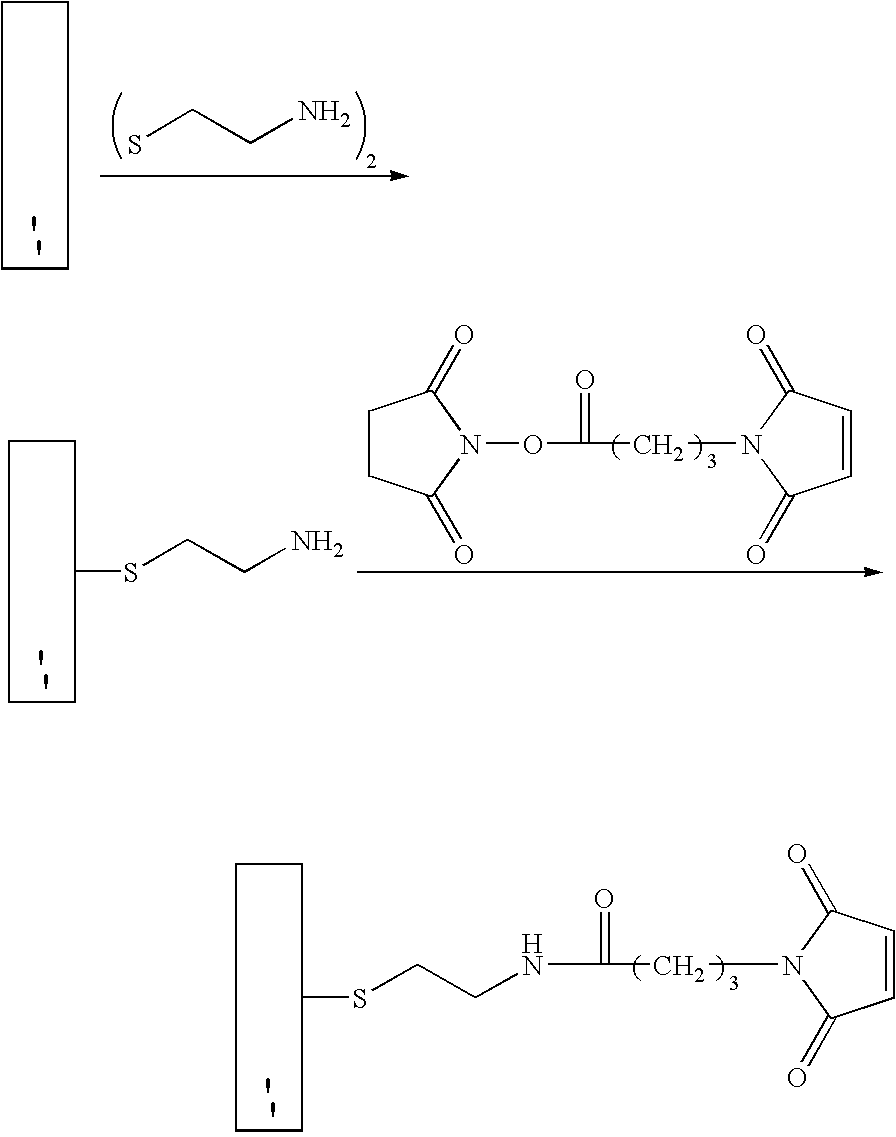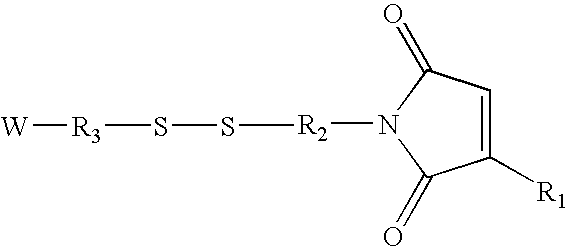Methods of detecting immobilized biomolecules
a biomolecule and immobilization technology, applied in the field of biochemical assays, can solve the problems of inability to achieve direct patterning of cells, and inability to achieve patterning directly
- Summary
- Abstract
- Description
- Claims
- Application Information
AI Technical Summary
Benefits of technology
Problems solved by technology
Method used
Image
Examples
example 1
[0337]A base plate according to the present invention, comprising a glass slide coated with a thin (45 nm) layer of gold, was coated with a mixed self-assembled monolayer (SAM) containing 2% maleimide-terminal groups in a background of tri(ethylene glycol) terminal groups. This entire surface was then exposed to a 500-μM solution of a peptide (IpYGEFKKKC) that was phosphorylated on its tyrosine residue. This peptide reacted with the maleimide groups on the surface via its terminal cysteine group to yield a surface composed of 2% of a monolayer of phospho-peptide. A PDMS removable member comprising 10 well orifices was removably sealed to the base plate, and the phospho-peptide exposed by the well orifices was exposed to different concentrations of protein tyrosine phosphatase (PTP-1B) via the well orifices. The plate was then incubated at 37° C. for 30 minutes to allow the enzymatic cleavage of the phosphoryl group from the immobilized peptide by PTP-1B.
[0338]The PDMS removable memb...
example 2
[0340]A base plate according to the present invention, comprising a glass slide coated with a thin (45 nm) layer of gold, was coated with a mixed self-assembled monolayer (SAM) containing 2% maleimide-terminal groups in a background of tri(ethylene glycol) terminal groups. Solutions of seven tyrosine-containing peptides in a buffer solution were then arrayed onto the base plate using a robotic split-pin arrayer (PixSys 5500, Cartesian Technologies). The robot was programmed to create a rectangular 5×12 set of microarrays spaced by 4.5 mm, each microarray being composed of 4×4 100-μm spots (2 spots of each peptide and 2 of buffer) spaced by 300 μm. The peptides were then allowed to attach via their terminal-cysteine residues and the plate was washed in SDS and water.
[0341]A PDMS removable member according to the present invention that contained a set of 5×12 well orifices spaced by 4.5 mm was then aligned and sealed to the base plate so that each microarray had a liquid-tight well de...
example 3
[0343]Base plates according to the present invention, comprising glass slides coated with a thin (45 nm) layer of gold, were coated with a mixed self-assembled monolayer (SAM) containing 2% maleimide-terminal groups in a background of tri(ethylene glycol) terminal groups. These surfaces were then exposed to a 500-μM solution of a peptide (CEQEDEPEGIYGVLF) that is a good substrate for Lck kinase. The peptide reacted with the maleimide groups on the surface via its terminal cysteine group to yield a surface composed of 2% of a monolayer of peptide.
[0344]PDMS removable members comprising well orifices were removably sealed to the base plates, and the peptide exposed by the well orifices was exposed to different lysates of cell lines that over-express a kinase, ATP, and other co-factors. The plate was then incubated at 37° C. for 30 min to allow the enzymatic transfer of a phosphate group from ATP to the immobilized peptide by the kinase. The increase in phosphotyrosine in the well-bott...
PUM
| Property | Measurement | Unit |
|---|---|---|
| size | aaaaa | aaaaa |
| size | aaaaa | aaaaa |
| time | aaaaa | aaaaa |
Abstract
Description
Claims
Application Information
 Login to View More
Login to View More - R&D
- Intellectual Property
- Life Sciences
- Materials
- Tech Scout
- Unparalleled Data Quality
- Higher Quality Content
- 60% Fewer Hallucinations
Browse by: Latest US Patents, China's latest patents, Technical Efficacy Thesaurus, Application Domain, Technology Topic, Popular Technical Reports.
© 2025 PatSnap. All rights reserved.Legal|Privacy policy|Modern Slavery Act Transparency Statement|Sitemap|About US| Contact US: help@patsnap.com



